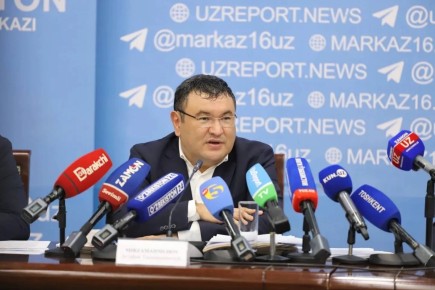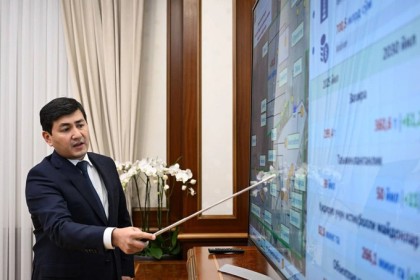Thank you to the American-Uzbekistan Chamber of Commerce for organizing this event. And congratulations on the rapid expansion of your membership to more than three times as many members today as you had three years ago. That reflects the growing commercial partnership between our countries.
Thank you also to our distinguished guests who travelled such long distances to attend this forum. I am happy to see some familiar faces. And I am honored to be here to express the U.S. Government’s commitment to deepening our engagement with Uzbekistan.
In May 2018, President Mirziyoyev made a historic first visit to the White House. During their meeting in the Oval Office, our two Presidents launched a new strategic partnership. It has continued at a high level ever since.
Last October, I was in Uzbekistan to meet with President Mirziyoyev and other government ministers and business leaders. While in Tashkent, I had the pleasure of speaking at the American-Uzbek Chamber’s 25th Annual Business Forum.
This past November, my Chief of Staff, Michael Walsh, met with then- Deputy Prime Minister Kholmuradov to further our engagement with Uzbekistan. And in April, I was pleased to host Deputy Prime Minister Ganiev here in Washington.
There is also a new U.S. ambassador to Uzbekistan: Dan Rosenblum, an expert on the region, and an aggressive advocate for U.S. business participation in Uzbekistan.
We have also been blessed by Ambassador Vahabov’s efforts to promote and strengthen U.S.-Uzbekistan economic relations. Thank you, Ambassador, for making yourself available to the American business community, and for your assistance in all of our joint efforts. I applaud the successful political and democratic reforms that are underway in Uzbekistan — and we continue to encourage the country’s commitment to them.
Because of the changes taking place, American companies are far more engaged than ever before in Uzbekistan. We are working with the Uzbek government to expand trade and deepen our economic cooperation.
For example, 13 top U.S. companies participated in a Commerce Department- Certified Trade Mission to Uzbekistan that we helped organize in June. Among the industries represented were mining, aerospace, agriculture, infrastructure, education, and consumer goods. Our ability to promote new trade opportunities and engage at a high level is the result of the Uzbek Government’s positive economic reforms.
In September 2017, the government began currency liberalization. It recently lifted its remaining currency controls, allowing Uzbeks to buy foreign currency predictably for the first time in many years. It has acted to make government affairs more transparent, and to promote accuracy of government data. And it has acceded to the World Intellectual Property Organization’s Copyright Treaty.
Under its President’s leadership, Uzbekistan is improving relations with its Central Asian neighbors, and is promoting regional integration and interconnectivity. Such activities are making Uzbekistan an increasingly attractive market, since companies can very easily serve the entire Central Asia region by operating from Uzbekistan.
These efforts are already producing positive results. U.S. trade with Uzbekistan has increased significantly, from $136 million in 2017 to almost $300 million in 2018. Through August 2019, U.S. exports to Uzbekistan jumped to $455 million, more than 100 percent ahead of last year’s solid pace. Uzbekistan has a real chance to become the leading export destination for U.S. goods in Central Asia this year.
However, there is more to be done to ensure the sustainability of these reforms. It is important that Uzbekistan not only establish, but also maintain a track record of transparency and rule of law.
Adopting global business practices is needed in customs procedures; in the protection of intellectual property; in taxes; and in regulations that impact exporters, importers, and investors. Opening up government procurement is another key.
One of the most significant goals of market reforms is Uzbekistan’ accession to the World Trade Organization. We strongly support this effort and look forward to the government’s response to questions from the WTO’s Memorandum of Foreign Trade Regime.
At the same time, we encourage our Uzbek partners to carefully consider the impact of new agreements on WTO accession. For example, pursuing membership right now in the Eurasian Economic Union could complicate and extend the WTO accession process beyond the timeline set by Uzbekistan’s leaders.
The United States is committed to being a strategic partner in Uzbekistan’s growth and development through trade, investment, and your outreach to other nations in Central Asia. The Department of Commerce is working diligently to convey the U.S. business community’s concerns to our Uzbek partners, as well as promoting the advantages of working with world-class American companies.
U.S. companies that are confident in making investments hire local workers. They create innovative products; take risks; invest in new factories and equipment; and generate tax revenues that benefit the broader community.
Other parts of the U.S. Government are also working to promote greater economic partnerships in Central Asia. The U.S. - Central Asia Trade and Investment Framework Agreement Council is meeting here in Washington as we speak. I am confident that as our governments and business communities work together, we will build on our present success and deepen our commercial and cultural ties.
We are extremely hopeful that our efforts will bring greater prosperity to both nations. This is a worthy cause; worthy of our time and effort. But, like everything, it will not happen unless we make it happen.
Thank you, again, for having me, and I look forward to continuing my work with all of you.












